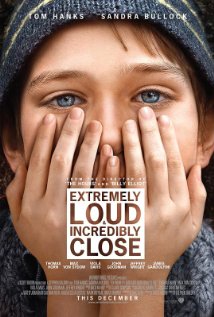Extreme Loud and Incredibly Close – 3/5 – Movie Reviews by Ry!
 Extremely Loud and Incredibly Close – 3/5 – This is a review for a film that came out a couple years ago, and was a nominee for ‘Best Picture’ in that year. After watching this film, I can see where the stars aligned to make it worth that kind of nomination. On the other hand, there are some deeply lacking moments and unnecessary plot points that bring the film down. Overall, Extremely Loud and Incredibly Close provide themes that are believable, but because of bland moments, it just makes it an underwhelming film.
Extremely Loud and Incredibly Close – 3/5 – This is a review for a film that came out a couple years ago, and was a nominee for ‘Best Picture’ in that year. After watching this film, I can see where the stars aligned to make it worth that kind of nomination. On the other hand, there are some deeply lacking moments and unnecessary plot points that bring the film down. Overall, Extremely Loud and Incredibly Close provide themes that are believable, but because of bland moments, it just makes it an underwhelming film.
Premise: A troubled young boy named Oskar (Thomas Horn), has his world turned upside down when he tries to cope with the loss of his father, Thomas (Tom Hanks). A year passes, when he discovers a mysterious key in his father’s belongings. What entails is a journey to find the matching lock. On this journey, he meets people, and he learns about himself, his family, and what it really means to be alive.
In the main role of Oskar, we have a young actor by the name of Thomas Horn. In this role, he provides a look into a typical kid; who is intriguing, innocence, but can be annoying throughout the movie. For a while, his antics and slick back-talking causes his annoyance to really obstruct any liking towards the character. About halfway through the film, once we start experience flashbacks of the ‘incident’ with his father, you start to realize that there are layers behind the antics. You begin to notice that how he thinks is for a reason, and you begin to slightly feel his pain and purpose in this journey. For the supporting cast, his father is played by Tom Hanks; his mother is played by Sandra Bullock, with some other noticeable people in the film, like Jeffrey Wright, Viola Davis, and John Goodman. For the mother and father, we get complimentary but enticing roles from both Tom Hanks and Sandra Bullock respectfully. They don’t stand out, or take over the movie with their own egos, but they provide quality and flavor to the ‘family’ issues, as well as reflection of people for Oskar to build on. The other supporting cast felt more like definition then actual characters. In their roles, they help string along the plot and themes in the film, causing them to be generic and provide less strength to the overall film experience.
For the direction of the film, it mainly stayed focused on the ‘coming of age’ theme, as well as ‘dealing with death’ scenarios for both Oskar, his mother, as well as some people affected by the incident. In a general scope, the broad themes in this film helps keep you engaged in the developing story involving Oskar. While he goes on his journey, you learns how lives that are so different, can weave a web of commonality to his own. The attachment is subtle, but it helps you feel a part of his life and journey, as well as people’s lives Oskar affects. At points, this thread gets stretched thin, when a lot of the ‘encounters’ just feel like you’re touching up a picture, instead of painting a full portrait. This causes some interactions between Oskar and some he meets to be less inviting, causing majority of the movie to be unappealing. What also hinders the movie and Oskar’s journey is the grandfather side plot. There is no need for this addition, and it only feels like an excuse to explain a past that didn’t have any reclamation towards the ending. Right when you think the film will turn for the worst, flashbacks occur. This flashbacks helps drive a layer in the direction, and give you the most poignant moments, and you feel raw emotions within Oskar and his mother, as well as for the father who lost his life in the ‘incident’. This helps flesh out the whole journey aspect, and his father’s influence to bring purpose to Oskar life. Once Oskar completes his journey, you know he has grown as person. You also see how this growth affects him, his mother, and everyone he has come across. This ending helps bring closure to the film, and helps negate all the thin points, making this journey feel like your own.
The cinematography is ironically good. You are given the backdrop of NYC, but in a way through a child’s perspective. Everything feels authentic, and you wanted to visit every place that Oskar did. You see all the five boroughs, and how each has countering perspective views. This helps develop a layering aspect of growth and meaning, complimenting Oskar’s own voyage. The score is relevant, but doesn’t really help or encumber the movie’s development, good or bad.
Overall, this movie is a very strong, inspirational one. It shows purpose through common themes of ‘coming of age’ and ‘dealing with death’. These great themes get dragged down by its slow moments and some annoying interaction from the main character. This combination cause the film to never reach a pinnacle of greatness. Even in this slow tide, you will be entertained, in a heartfelt way. I recommend this for people who like inspirational tales, and looking for a different kind of film to rent on a Friday Night.